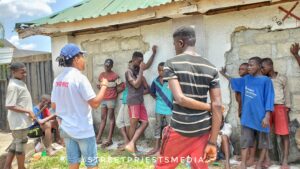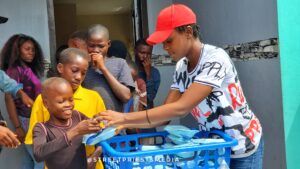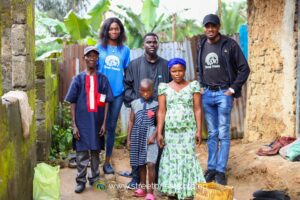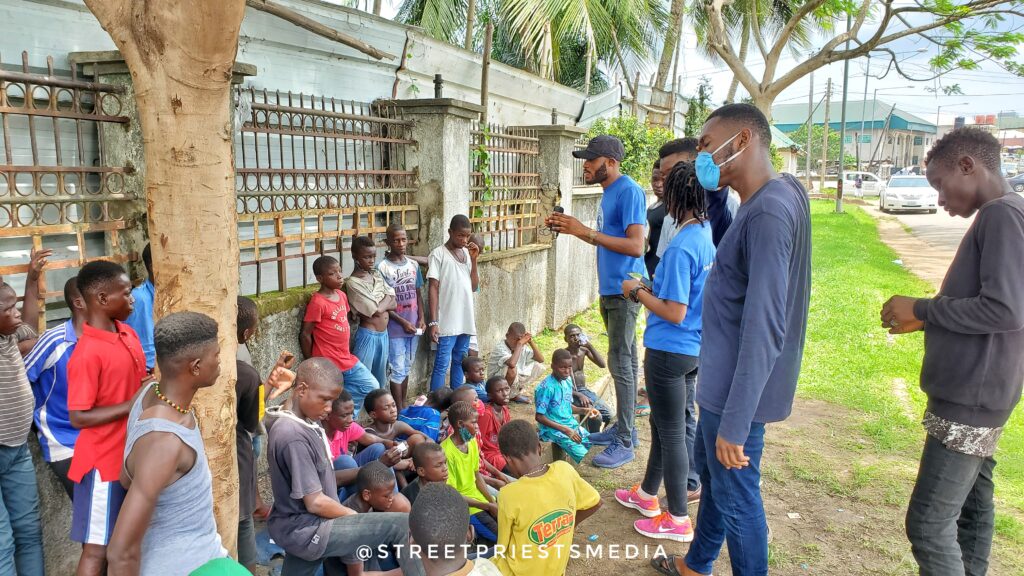Arinze Chijioke
The trajectory of James Okina’s life changed for the worse after his parents separated in 2009. While his mother took his young brother away, he and his elder brother stayed with their father who was not always at home.
He would always beat them up whenever he returned from his outings. As a result, James followed other children on the streets of Calabar in Cross River State and stopped paying attention to his education.
Although he knew that it was not the kind of life, he wanted for himself, Okina, who was 8 at the time could not help but spend more time with other children who had also left their homes.

“I was happy with my ‘freedom but I lacked guidance and was confused,”Okinna said. “There was no one to advise me. Together with the kids, we moved around, stealing and destroying property.”
Okina continued that way for three years till after his cousin Tochi, who according to him, used to reach out to young people in high schools and barracks in Lagos with reading materials, came to live with him and his brothers.
Each time he held conversations with his cousin, Okina became encouraged to pursue after greatness. Soon, he took his studies seriously and started performing well again in class.
“He acted like a big brother and his lifestyle (particularly his faith in God) that inspired me to get my act together,” Okina who was 12 at the time said. “The fact that he was focused and knowledgeable motivated me.”
While there is no comprehensive data on the total number of street children in Nigeria, Nigeria’s Federal Ministry of Women Affairs and Social Development estimates that there are 17.5 million orphans and vulnerable children (OVC) nationwide. States like Lagos and Gombe, are estimated to have over 100,000 street kids.
These children face several challenges to their health and development and it is estimated that 95 percent of OVC do not receive any type of medical, emotional, social, material, or school-related assistance. They are among the about 10.5 million of the country’s children that are said to be out of school, a number which is the highest in Sub-Saharan Africa.
What is most worrying however is that while national laws like the Child Rights Act exist to protect children against all forms of abuse in Nigeria, innocent children still face inhuman treatment due to poor implementation and lack of awareness.
Acting
Although Okina had had a change of character, he could not turn a blind eye to the challenges other children face. So, he began to further interact with the ones he came across in his immediate environment.
“I was frustrated by the incessant assigning of blame about whose responsibility ‘street children’ were by adults he spoke to about the children,” Okina said in an interview. “And so, I concluded that “in a time when people tend to hold the government or the clergy responsible for change in the society, I could become the priest on the street.”
Among these children was Frederick, a 13-year-old boy whom he had met at a football match the year he graduated from secondary school. His mother, with whom he shared a room had left eight months earlier and so, he had to fend for himself, together with his friend Kelvin. They both survived by begging during the day and performing at bars in the evening.
“I started visiting and spending time with them,”Okina said. “We connected because of the conversation we had and not about the food and the money I gave them. The more we talked, the more I felt a burden that I have to do more.”

Although he did not have much money, he knew that the boys needed help. So, he spoke to everyone who had ears to hear about the problem. Among those he spoke to was a man in his church, Inyang Edem who agreed to assist with taking care of the boys.
“He agreed to donate the fees and other requirements for Frederick’s and Kelvin’s education and after I got these two kids back to school, I couldn’t avoid it. I got myself more and more entangled,” he said.
Among the leading cause of the rise of children on the streets, Okina said is poor parenting and peer pressure and stigmatisation. For him, parenting goes beyond just giving birth to a child.
“When a child for reasons ranging from poverty to illiteracy is forced to find refuge in the streets, this affects the child psychologically and in turn makes their rehabilitation process a lot more difficult to achieve.”
In 2014, Okina who was now 15 – driven by his experiences – started Street Priests Incorporated, a registered youth-led social enterprise primarily operating out of Calabar, southern Nigeria. The vision is to transform the lives of street children and turn their potentials into assets for society
Initiatives for children
The NGO has five thematic program areas it implements in response to the challenge of children on the streets, including the center programs, back to school scholarship program, feeding program, reunification, advocacy and the Stakeholders’ Management.
Under the Center Programs, the NGO runs daily unconventional educational programs and activities which help improve the intellectual skills of children, boost their knowledge of good life hacks and refine their behavior, preparing them for formal school settings and reintegration into the society.
With its back-to-school scholarship program, the NGO facilitates access to quality education through scholarship programme for both children on the streets and at-risk children. Okina says the process is crucial as it involves a lot of mental, emotional and physical evaluation of the children to ensure they are ready for the journey that lies ahead of them in their academic pursuits.
Because of its understanding that proper nutrition is an important aspect of every child’s development, The NGO provides daily meals for the children and organise large food drives occasionally which cuts across major areas of the city under its feeding programme.

“Through our Individual Child Care Team (ICCT), Street Priests tracks, reunite and follows up the progress of children with their families after proper background research and evaluation as to why the child ended up on the street,” said Miracle Emmanuel, Chief Storyteller at Street Priests.
Under the advocacy program, the NGO organises seminars and conferences to ensure that the rights of the children are protected in the process through our partnerships with law enforcement agencies such as the Basic Rights Counsel Initiative (BRCI).
With the stakeholders’ management program, the NGO facilitates programs to equip volunteers with the relevant knowledge and skills that improve their intellectual and emotional ability to serve the children. These programmes range from seminars and mini-conferences to digital skills training and leisure programs to boost an all-round capacity for the work they do.
Successes
Since its establishment in 2014, Street Priests has impacted over 17,078 children through its programmes and projects. The NGO has also reunited 19 children with their families while 256 children have been enrolled in school.

As part of its efforts to give children a better life, the NGO in 2020, executed a research project, “No Existe,” in partnership with Bleed Red Campaign, a US organisation. The aim, according to Okina was to study the problem of street children in Brazil, the Dominican Republic, and the United States.
“The Dominican Republic research was published and presented at Oxford University, England, and Lynn University, USA,” Emmanuel said adding that the NGO has also trained and engaged over 400 volunteers via our volunteer network.
Challenges
Although Street Priests has raised over $70,000 since inception, limited resources remain a major challenge for the NGO.
“Seeing that the work we do cuts across different areas and layers, the resources required to tackle these challenges, including personnel, material and financial resources are enormous,” said Emmanuel.
Emmanuel adds that the NGO faces another challenge of housing the children as most of them find it difficult being confined in a space and having to adhere to rules after they have been exposed to a certain level of freedom.
“When we started, we tried housing them through the aid of well-meaning individuals who were willing to lend a helping hand at the time but it wasn’t so productive,“ he said.
He however explained that the NGO tries to house some children in present times with its partnering transition homes such as SYDRI (Society for Youth Development Rescue Initiative) – a transitional and rehabilitation home that offers foster care to children on the streets helping reintegrate them back to their families.
“And we only do so with the children who are really interested in going back home or leaving the streets. So, it makes it easier to manage the situation.”
“As we expand, we would look into that and see what steps we can implement to help the housing process.”
Part of what the NGO also plans to do is spread its wings to other parts of Nigeria and the world at large as according to him, this would lead to an increase in the volunteer base, partners and donors, resources and impact rate.
“The dream is bigger than we are but we are resilient and eager to see a society that is inclusive of everyone, giving a fair chance to all no matter how small or great they may be,” Emmanuel said.

